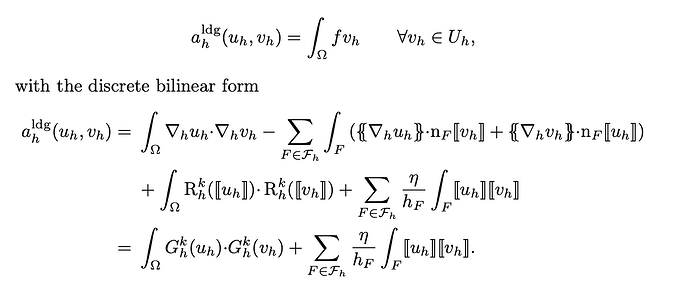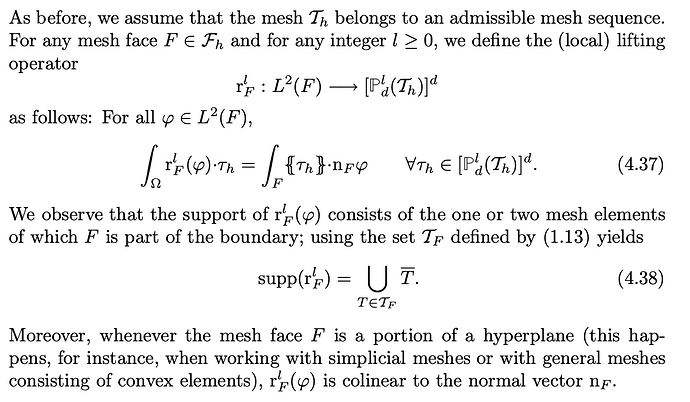Hi,
I am trying to implement a local discontinuous Galerkin (LDG) method for the Laplace equation with homogenous Dirichlet boundary condition. This requires the implementation of a lifting operator. The formulation and the definition of lifting operators are shown in the attached pictures (from the book “Mathematical Aspects of Discontinuous Galerkin Methods” by Di Pietro and Ern).
I have written a working code “LDG_poisson.py” as attached. However, this code is quite slow and clearly not optimal in computational efficiency. I suppose the reason is that I solve a global problem for the lifting R(\jump{phi_i}) of the jumps of basis function phi_i:
\int_{\Omega} R(\jump{phi_i}) \dot \tau = \sum_F \int_{F} (\average{\tau} \dot n_F) \jump{phi_i},
for any test function \tau in the lifting space. In the assembly of stiffness matrix, I have to iterate all the basis function phi_i and solve the lifting R(\jump{phi_i}) , which makes the code quite slow when mesh size is small.
I want to optimize the current code by solving the lifting operator as a local problem, because for any \phi_i supported in an element T the lifting R(\jump{phi_i}) is actually supported in T and its neighboring elements.
I am wondering what would be the best way in NGSolve to solve a local problem as in the attached picture “local_lifting”?
I have tried to compute an integral at a specific edge by a function like this:
def edge_integral(edge,mesh,f): # using 5 points Gauss_lobatto rule
v=edge.vertices
v1=np.array(mesh[v[0]].point)
v2=np.array(mesh[v[1]].point)
v3=(v1+v2)/2
v4=v3+(v2-v3)*sqrt(3/7)
v5=v3-(v2-v3)*sqrt(3/7)
w1=0.1
w2=0.1
w3=32/45
w4=49/90
w5=49/90
len = sqrt((v1[0]-v2[0])**2+(v1[1]-v2[1])**2)
integral = f(mesh(v1[0],v1[1]))*w1 + f(mesh(v2[0],v2[1]))*w2 + f(mesh(v3[0],v3[1]))*w3 + f(mesh(v4[0],v4[1]))*w4 + f(mesh(v5[0],v5[1]))*w5
return (len/2)*integral
However, I found calling this function is even slower than the “Integrate” command that computes the integral over the whole domain. I need to compute such an integral for O(1/h^2) times in the assembly of stiffness matrix, and an inefficient computation of local integrals can hinder the speed quite a lot.
I really appreciate in advance any suggestion on the implementation of lifting operator and solving local problems.
Best regards.
LDG_poisson.py (4.7 KB)



